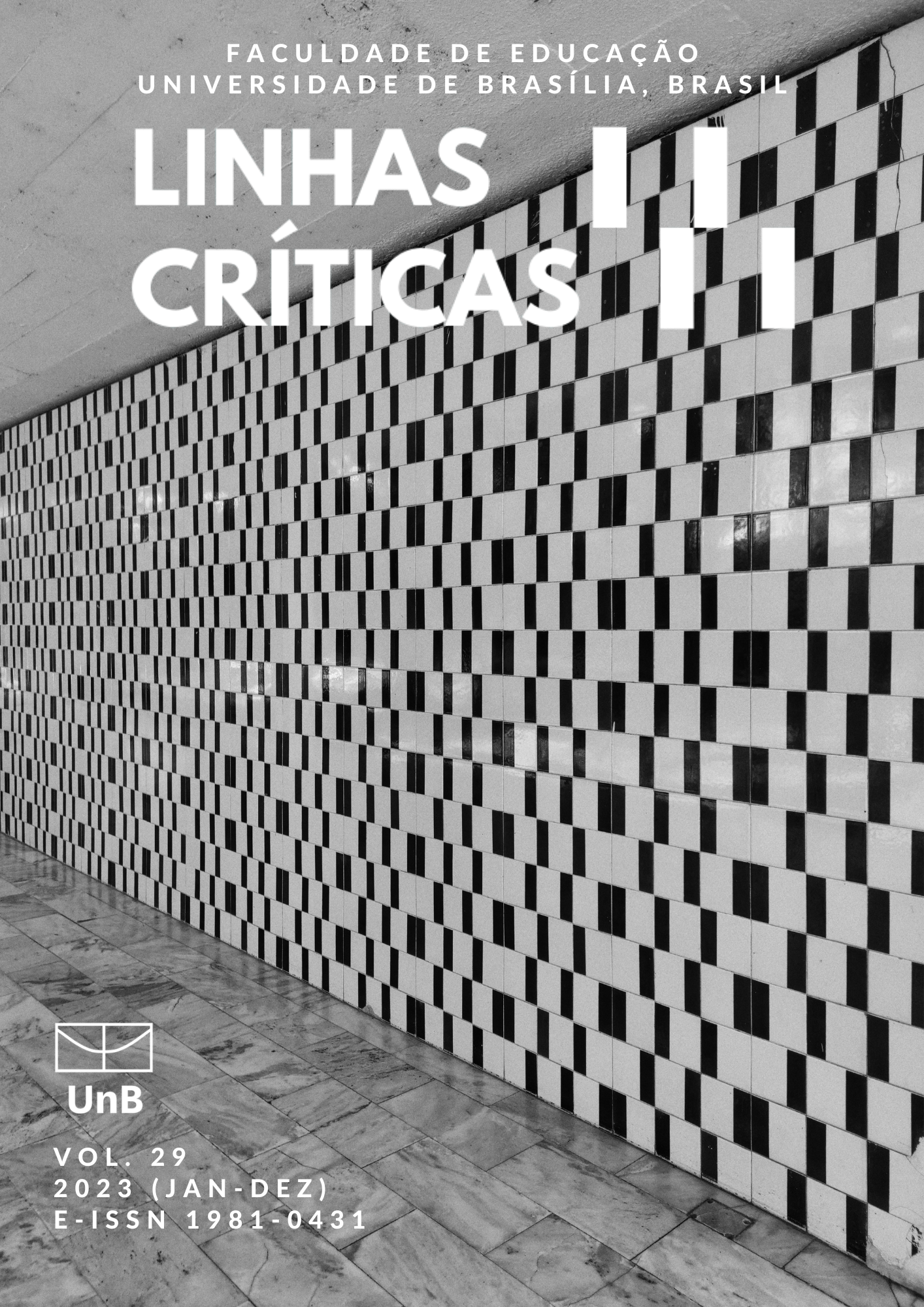The training of electoral judges in the view of trainers and magistrates
DOI:
https://doi.org/10.26512/lc29202347147Keywords:
Formation of trainers, Teaching, Enfam, Training of judgesAbstract
This article is guided by the question: What is the view of trainers of electoral judges on their training for teaching and their performance, and the view of electoral judges, who went through the training process proposed by the Enfam? A questionnaire was applied to the current trainers of electoral magistrates in Minas Gerais, in a total of seventeen, and a questionnaire to eleven electoral judges. In summary, although most trainers do not have specific pedagogical training, perceive the importance of didactic-pedagogical aspects, so that training courses for magistrates contribute to the exercise professional of these judges.
Downloads
References
Brasil. (1988). Constituição da República Federativa do Brasil. Congresso Nacional do Brasil. http://www.planalto.gov.br/ccivil_03/constituicao/constituicao.htm
Brasil. (2009). Resolução n.º 75/2009 (Dispõe sobre os concursos públicos para ingresso na carreira da magistratura em todos os ramos do Poder Judiciário nacional.) Conselho Nacional de Justiça (CNJ). https://atos.cnj.jus.br/files/compilado2220432023041264372ebbd4a49.pdf
Brasil. (2016). Resolução n.º 2/2016 (Dispõe sobre os programas para a formação e o aperfeiçoamento de magistrados e regulamenta os cursos oficiais para o ingresso, a formação inicial e o aperfeiçoamento de magistrados e de formadores). Superior Tribunal de Justiça (STJ). https://bdjur.stj.jus.br/jspui/handle/2011/102269
Brasil. (2017). Resolução n.º 7/2017 (Diretrizes Pedagógicas da Enfam). Superior Tribunal de Justiça (STJ). https://bdjur.stj.jus.br/jspui/handle/2011/116264
Brasil. (2018). Resolução nº 05/2018 (Institui as Diretrizes Curriculares Nacionais do Curso de Graduação em Direito e dá outras providências) Conselho Nacional de Educação (CNE). http://portal.mec.gov.br/docman/dezembro-2018-pdf/104111-rces005-18/file.
Brasil. (2019). Resolução n. 7 de 8 de agosto de 2019 (Aprova o Projeto Pedagógico e o Plano de Desenvolvimento Institucional 2019-2023 da Escola Nacional de Formação e Aperfeiçoamento de Magistrados Ministro Sálvio de Figueiredo Teixeira). Superior Tribunal de Justiça (STJ). https://bdjur.stj.jus.br/jspui/handle/2011/133159
Brasil. (2021). Ofício circular n.º 2/2021 (Orientações para procedimentos em pesquisas com qualquer etapa em ambiente virtual). Ministério da Saúde. Comissão Nacional de Ética em Pesquisa (CONEP). http://conselho.saude.gov.br/images/Oficio_Circular_2_24fev2021.pdf
Escola Nacional de Formação e Aperfeiçoamento de Magistrados (Enfam). (2017a). Diretrizes Pedagógicas (Texto Principal). https://www.enfam.jus.br/wp-content/uploads/2017/12/Res_7_Enfam_2017_Diretrizes_Pedagogicas_Enfam-_Texto_-Principal.pdf
Escola Nacional de Formação e Aperfeiçoamento de Magistrados (Enfam). (2017b). Apresentação sistematizada das Diretrizes Pedagógicas (Apêndice A). https://www.enfam.jus.br/wp-content/uploads/2017/12/Res_7_2017_Enfam_Diretrizes_Pedagogicas_Enfam_-Apendice_A.pdf
Escola Nacional de Formação e Aperfeiçoamento de Magistrados (Enfam). (2019). Projeto de Desenvolvimento institucional 2019-2023 (Diretrizes gerais para realizar e orientar a formação e o aperfeiçoamento de magistrados -Justiça Federal e Estadual). https://www.Enfam.jus.br/wp-content/uploads/2019/10/Projeto_pedagogico_institucional.pdf
Fleury, M. T. L., & Fleury, A. (2001). Construindo o conceito de competência. Revista de Administração Contemporânea, Edição Especial, 183-196. https://doi.org/10.1590/S1415-65552001000500010
Libâneo, J. C. (2012). Ensinar e aprender, aprender e ensinar: o lugar da teoria e da prática em Didática. Em J. C. Libâneo, & N. Alves. Temas de Pedagogia: diálogos entre didática e currículo (pp. 35-60). Cortez.
Mizukami, M. da G. N. (2004). Aprendizagem da docência: algumas contribuições de L. S. Shulman. Revista do Centro de Educação da UFSM, 29(2), pp. 33-50. https://periodicos.ufsm.br/reveducacao/article/view/3838
Oliveira, M. da S. (2014). Formação docente no âmbito da magistratura: um debate curricular. [Dissertação de Mestrado, Universidade de Brasília]. Repositório Institucional da UNB. https://repositorio.unb.br/handle/10482/17066
Oliveira, M. S., Cordeiro, K. A. C. P, Garani, S. R., Machado, L. C., Souza, M. E., & Veiga, M. R. M. (2015). Planejamento de ensino no contexto da magistratura: fundamentos e práticas pedagógicas. Enfam.
Shulman, L. (1986). Those who understand knowledge growth in teaching. Educational Research, 15(2), 4-14. https://doi.org/10.2307/1175860
Tardif, M. (2018). Os professores diante do saber: esboço de uma problemática do saber docente. Em M. Tardif. Saberes docentes e formação profissional. Vozes.
Veiga, I. P. A., & Fernandes, R. C. de A. (2020). Por uma didática da educação superior. Autores Associados.
Vigotski, L. S. (1997). Obras Escogidas. T. II (pp. 181-285). Visor.
Published
How to Cite
Issue
Section
License
Copyright (c) 2023 Alcineia Suely de Sales, Marilene Ribeiro Resende

This work is licensed under a Creative Commons Attribution 4.0 International License.
Authors who publish in this journal agree to the following terms:
-Authors maintains the copyright and grants the journal the right of first publication, the work being simultaneously licensed under the Creative Commons Attribution License which allows the sharing of the work with recognition of the authorship of the work and initial publication in this journal.
- Authors are authorized to enter into additional contracts separately, for non-exclusive distribution of the version of the work published in this journal (eg publish in institutional repository or as a book chapter), with acknowledgment of authorship and initial publication in this journal.
-Authorers are allowed and encouraged to publish and distribute their work online (eg in institutional repositories or on their personal page) at any point before or during the editorial process, as this can generate productive changes as well as increase the impact and the citation of published work (See The Effect of Free Access).



